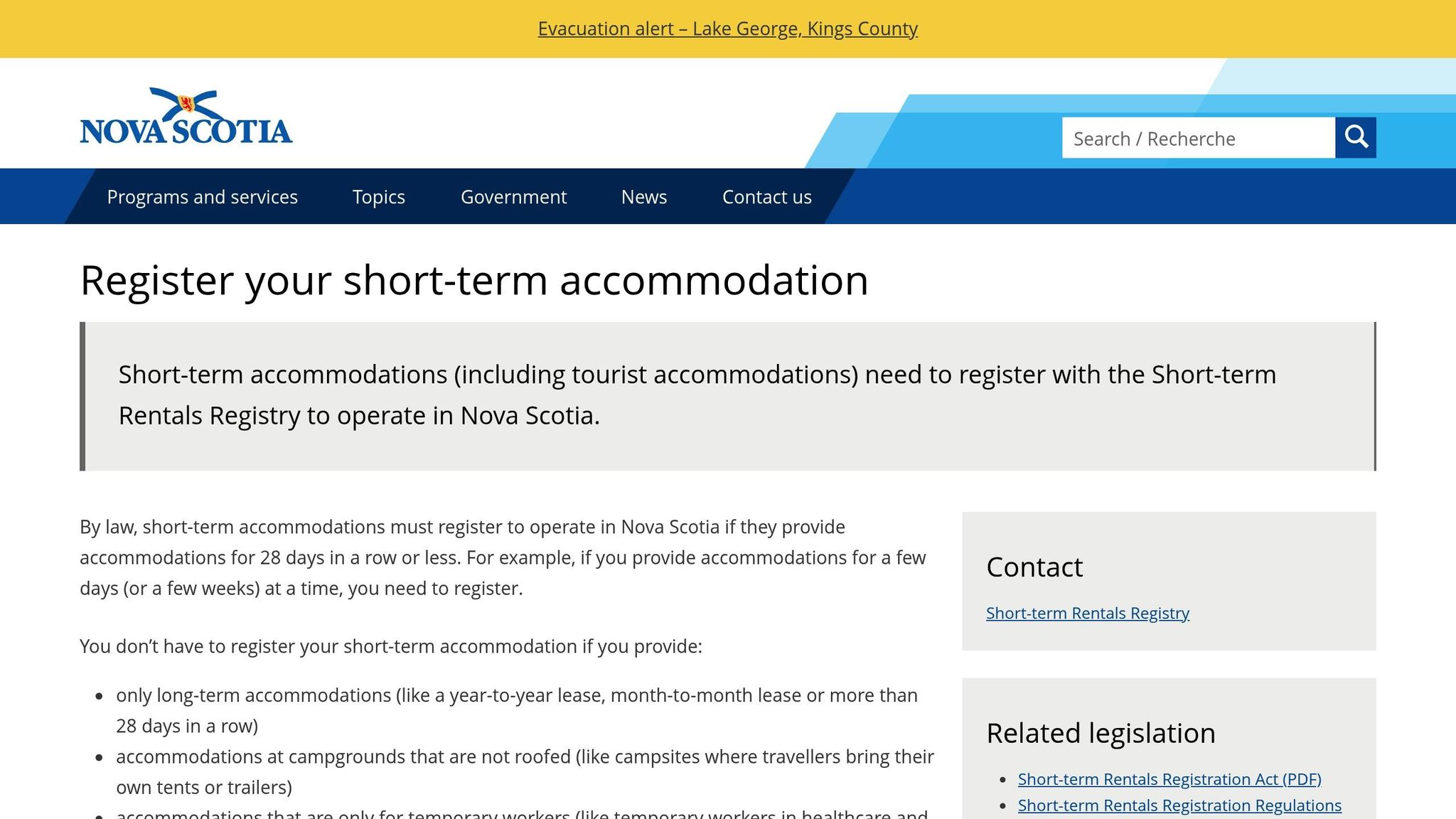Airbnb is legal in Nova Scotia, but operating a short-term rental (STR) requires compliance with provincial and municipal regulations. Here's what you need to know:
- Registration is mandatory under the Short-Term Rentals Registration Act for all properties rented for 28 days or less. Categories include primary residences, commercial rentals, and tourist accommodations.
- Tax obligations include collecting and remitting the 15% Harmonized Sales Tax (HST) and, in some cases, local accommodation taxes.
- Municipal by-laws vary, so check local rules on zoning, occupancy limits, and other requirements.
- Non-compliance can result in fines, delisted properties, and loss of insurance coverage.
Staying compliant ensures legal operation and allows you to claim business expenses to offset costs. To simplify management and boost income, professional services like Casa Scotia can help with compliance, pricing, and guest communication.
Nova Scotia's New Short-Term Rental Regulations: What You Need to Know
Nova Scotia Short-Term Rental Laws
Nova Scotia has established a framework for regulating short-term rentals through the Short-Term Rentals Registration Act and various municipal by-laws. Here's a closer look at how these provincial and local requirements work.
Provincial Rules: Short-Term Rentals Registration Act
The Short-Term Rentals Registration Act requires all short-term rental hosts and platform operators to register every year [1]. According to this legislation, short-term rentals (STRs) are defined as accommodations rented out for 28 days or less [1].
The Act categorizes hosts into three groups:
- Whole Home Primary Residence Short-Term Rental Hosts: These are individuals renting out their entire primary residence.
- Commercial Short-Term Rental Hosts: This category includes hosts offering properties that aren’t their primary residence, such as investment properties, secondary homes, or individual rooms in non-primary residences. For example, secondary or backyard suites are generally considered commercial unless the host lives there [1].
- Traditional Tourist Accommodation Hosts: This group includes operators of bed and breakfasts, hostels, hotels, motels, or personal vacation homes. Personal vacation homes have a specific rule under the Act - they can only be rented out for a maximum of 150 days per registration year [1].
Municipal By-Laws and Zoning Regulations
Beyond the provincial rules, municipalities across Nova Scotia may enforce their own by-laws and zoning regulations. These local rules often address concerns like zoning classifications or occupancy limits. To ensure compliance, check with your local municipality for specific requirements.
September 2024 Updates
On 30 September 2024, new regulatory changes came into effect [1][2]. Be sure to review these updates to stay aligned with the latest rules.
Registration and Licensing Requirements
Once you’ve familiarized yourself with the regulations, the next step is registering your short-term rental in Nova Scotia. This is not just a legal requirement but also helps the province keep track of such accommodations.
How to Register with the Tourist Accommodations Registry

To get started, head to the official Tourist Accommodations Registry portal. You’ll need to submit specific details about your property, such as proof of ownership or lease, zoning compliance documents, and any other required permits.
Understanding the Different STR Categories
The registration process depends on the type of short-term rental (STR) you’re operating. Here’s a quick breakdown:
- Primary residence rentals: These typically have fewer requirements.
- Non-primary or commercial rentals: These need more documentation to meet compliance standards.
- Dedicated tourist accommodations: These involve more detailed and stringent registration procedures.
Registration Fees and Timelines
The fees and processing times will depend on the category of your rental. Once registered, your approval is valid for a specific period and must be renewed periodically. After approval, you’ll receive a registration number that must be clearly displayed in all your rental listings. This number serves as proof of compliance, and failing to display it could lead to penalties.
Make sure to keep your registration certificate and number handy to avoid any issues with compliance.
sbb-itb-b5e1074
Tax Obligations for STR Hosts
Running a short-term rental (STR) in Nova Scotia comes with specific tax responsibilities at both the provincial and local levels. These obligations vary based on the type of rental property and its location, so understanding them is crucial.
Tax Requirements for STR Hosts
In Nova Scotia, STR hosts are generally required to collect and remit the Harmonized Sales Tax (HST) on rental income. The current HST rate in the province is 15%, which includes both the federal Goods and Services Tax (GST) and the provincial sales tax. This tax applies to most rental bookings, regardless of the size or type of property.
In addition to HST, some municipalities impose local tourism or accommodation taxes. These are typically collected from guests and must be remitted to the appropriate local authority. It’s important to check with your municipal government to confirm whether such taxes apply to your rental and how they should be handled.
All rental income earned from STR operations must also be reported on your annual income tax return. Eligible expenses - like cleaning services, utilities (if applicable), and maintenance costs - can be deducted to offset taxable income.
Reporting and Payment Schedules
If your annual rental revenue exceeds $30,000, you are required to register for HST and file returns. Most hosts file quarterly, but the exact schedule can depend on individual circumstances.
For local accommodation taxes, reporting deadlines and procedures vary by municipality. Be sure to consult your local tax authority to understand the specific requirements, deadlines, and any penalties for non-compliance.
Keeping detailed financial records is essential. This includes tracking guest payments, service fees, and any taxes collected. According to the Canada Revenue Agency (CRA), these records must be retained for six years from the end of the tax year they pertain to.
The table below outlines the tax rates and obligations for different types of STR properties in Nova Scotia:
Tax Rates by STR Category
| STR Category | HST Rate | Local Accommodation Tax | Income Tax | Registration Threshold |
|---|---|---|---|---|
| Primary Residence (room rental) | 15% | Varies by municipality | All rental income | $30,000+ annual revenue |
| Secondary Property (entire unit) | 15% | Varies by municipality | All rental income | $30,000+ annual revenue |
| Commercial STR (multiple properties) | 15% | Varies by municipality | All rental income | Registration required regardless of revenue |
Commercial STR operators face stricter requirements. They must register for HST immediately, regardless of their revenue, and may undergo more frequent audits and compliance checks.
For tailored advice, consider consulting an accountant who specializes in Nova Scotia’s STR tax regulations. Staying informed and compliant can help you avoid unnecessary penalties.
Staying Compliant and Growing Your Rental Income
Managing a short-term rental in Nova Scotia isn’t just about welcoming guests - it’s about staying on top of regulations while maximizing your income. To succeed, you need systems that keep your property compliant and profitable. Balancing these two aspects is key to running a stress-free and rewarding rental business.
Best Practices for Legal Compliance
Start with a compliance checklist to ensure you meet all legal requirements. This includes registering with the Tourist Accommodations Registry and keeping your registration certificate easily accessible for inspections.
Organize your finances by maintaining digital records of all income and expenses. This not only simplifies tax season but also prepares you for any audits that might come your way.
Stay ahead of the game by monitoring regulatory updates. Subscribe to updates from your local government and the Nova Scotia Department of Municipal Affairs and Housing. Joining short-term rental (STR) host groups on social media is another great way to stay informed, as members often share news and advice.
Document your compliance efforts by keeping photos and certificates of fire safety equipment inspections, building permits, and any accessibility updates. These records can speed up inspections and demonstrate your commitment to safety.
Finally, establish clear communication with guests about house rules, noise bylaws, and parking restrictions. Many compliance issues arise from guest behaviour, so setting expectations upfront can help avoid problems with neighbours or local authorities.
Once you’ve laid this groundwork, Casa Scotia can take your rental management to the next level.
How Casa Scotia Simplifies STR Management

Casa Scotia makes it easier to manage short-term rentals while boosting your revenue. Their services handle the heavy lifting so you can focus on other priorities.
- Professional staging and photography ensure your listing grabs attention. By showcasing your property’s best features, Casa Scotia also highlights compliance and safety measures to reassure guests.
- Dynamic pricing tools automatically adjust your rates based on demand, local events, and competitor activity. This approach helps you capitalize on peak periods like Halifax’s summer festivals or Cape Breton’s scenic fall season.
- Guest screening and communication reduce risks like noise complaints or property damage. Casa Scotia takes care of all guest interactions, ensuring smooth stays and positive reviews.
- Compliance support keeps you up to date with changing regulations. Casa Scotia tracks municipal bylaws, provincial rules, and tax obligations, making sure your property remains legally compliant without requiring constant oversight from you.
- Multi-platform marketing increases your property’s visibility. Casa Scotia manages listings across platforms like Airbnb and Vrbo, coordinating calendars and pricing to avoid double bookings while reaching more potential guests.
Casa Scotia Management Plans Compared
Casa Scotia offers two management plans tailored to different rental goals:
| Feature | Year-Round Management | Peak-Season Management |
|---|---|---|
| Service Period | 12 months continuous | May through September |
| Revenue Strategy | Steady income year-round | Focus on summer peak earnings |
| Personal Use | Flexible access year-round | Full access October to April |
| Off-Season Options | Mid-term rental placement | Personal use off-season |
| Maintenance Coordination | Ongoing property care | Summer-only maintenance |
| Commitment Level | Annual contract | Seasonal flexibility |
| Best For | Investors seeking steady income | Owners wanting summer income and off-season use |
The Year-Round Management plan is ideal for investors who want consistent income throughout Nova Scotia’s varying seasons. Casa Scotia even offers mid-term rental options during slower winter months to keep the cash flow steady.
The Peak-Season Management plan is perfect for cottage owners who want to enjoy their property during the quieter fall and winter months while earning income during Nova Scotia’s busy summer tourism season. This plan focuses on the high-demand period from May to September, maximizing your earnings when it matters most.
Both plans include an owner portal for real-time updates and detailed financial reporting, giving you full transparency and peace of mind.
Conclusion: Managing STR Rules Successfully
Running a short-term rental (STR) in Nova Scotia involves much more than just listing your property online. Navigating the legal landscape is essential, especially with recent updates tightening registration and enforcement processes. These changes highlight the importance of adopting practical management strategies to ensure everything runs smoothly.
To succeed, stay organized and ahead of the game. Make sure to register with the Tourist Accommodations Registry and fulfil all tax requirements. Local bylaws differ widely across regions like Halifax, Cape Breton, and rural areas, so it's vital to understand the specific rules in your area to avoid potential penalties.
For many, professional management services like Casa Scotia offer a practical solution. Their all-encompassing approach not only simplifies compliance but also boosts revenue. With tools like dynamic pricing and multi-platform marketing, they help you tap into Nova Scotia's bustling tourism season. Plus, their compliance expertise ensures you keep up with changing regulations.
Ultimately, the right management approach depends on your financial goals and how hands-on you want to be. Investing in proper management and staying compliant can lead to higher occupancy rates, glowing guest reviews, and the reassurance that your property operates within the law.
FAQs
What are the consequences of not following Nova Scotia's short-term rental rules?
Failing to follow Nova Scotia's short-term rental rules can lead to hefty fines, anywhere from $1,000 to $100,000 CAD, depending on how serious the violation is.
To steer clear of these penalties, hosts need to familiarize themselves with the regulations. This includes meeting licensing requirements, respecting zoning laws, and fulfilling tax responsibilities. Keeping up with these rules not only shields you from fines but also strengthens your credibility with guests and fosters goodwill within the local community.
How can I tell if my short-term rental is a primary residence, commercial property, or tourist accommodation in Nova Scotia?
To figure out how your short-term rental is classified in Nova Scotia, think about how the property is primarily used:
- Primary residence: If this is where you live most of the year, you might occasionally rent out a room or part of the home for short periods.
- Commercial or tourist accommodation: These are properties rented out for shorter stays - typically less than 28 days - as part of a business. Such properties usually need to be registered and licensed under Nova Scotia's short-term rental rules.
The classification hinges on factors like usage, ownership, and local zoning laws. Make sure to check your municipality's specific regulations and registration requirements to confirm your property's classification and stay compliant.
How can I make sure my short-term rental in Nova Scotia follows all provincial and municipal rules?
To ensure your short-term rental in Nova Scotia meets all legal requirements, the first step is registering your property with the Nova Scotia Tourist Accommodations Registry. Beyond registration, it's essential to review your municipality's specific rules - this could include permits or zoning by-laws that pertain to short-term rentals. Make sure your property complies with these local regulations.
You might also need to submit documents like proof of insurance or safety certifications. Stay on top of inspections and updates to local laws to avoid any compliance issues. Taking these steps ensures your rental operates within the law and minimizes the risk of penalties.
Related Blog Posts
- Short term rental regulation in HRM ( Halifax, Bedford, Dartmouth )
- Short-Term Rental Regulations in Nova Scotia: Cape Breton Island (Sydney, Baddeck, Inverness)
- Short-Term Rental Regulations in Nova Scotia: Eastern Shore (Sheet Harbour, Guysborough, Sherbrooke)
- Short-Term Rental Regulations in Nova Scotia: Yarmouth & Acadian Shores (Yarmouth, Clare, Digby)



